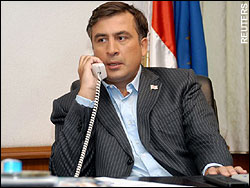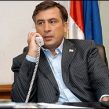
TBILISI NEUTRALIZES ALLEGED RUSSIAN SPY RING, GAINS POLITICAL MILEAGE
Publication: Eurasia Daily Monitor Volume: 3 Issue: 181
By:

The arrest of four Russian military intelligence officers and eleven alleged accomplices in Georgia on September 27-28 is part of Tbilisi’s ongoing efforts to neutralize a purported Russian spy network in Georgia. Two weeks earlier, on September 6, Tbilisi claimed to have averted a coup by arresting dozens of Russia-financed, pro-Moscow activists who reportedly were plotting to remove the government of President Mikheil Saakashvili by force (see EDM, September 14). In March, after the arrest of the alleged Russian mole Simon Kiladze, an employee of the presidential administration, Saakashvili publicly guaranteed the safety of any Georgians collaborating with foreign intelligence who would give themselves up before May 1 (see EDM, March 31).
The Russian officers and Georgian citizens are being held on charges of espionage, while the Georgian citizens also stand accused of high treason. Georgian law enforcement provided evidence in the form of recorded telephone conversations between the detainees and video footage made by a hidden camera showing one of the Russians handing over money to an undercover Georgian agent (www.police.ge).
Georgian Interior Minister Vano Merabishvili told a news conference on September 27 that for “months and years” the arrested military intelligence (GRU) operatives and their Georgian collaborators had been gathering sensitive economic, political, and military information, including developments in Georgia-NATO relations. Merabishvili said the group was planning “serious provocations,” but he did not provide details (TV-Rustavi-2, September 27). According to him, GRU Colonel Anatoly Sinitsin directed the group from Yerevan, the capital of Armenia. In fact, most of the Georgian citizens under arrest are ethnic Armenians.
On September 29, a Tbilisi court sentenced the four Russian officers — Lieutenant-Colonel Alexander Savva, Lt. Col. Dimitry Kazantsev, Lt. Col. Alexei Zavgorodny, and Major Alexander Baranov — to two months in pre-trial detention. Ten of the Georgian citizens were also remanded to custody. On September 29, videotaped confessions surfaced showing five of the arrested Georgian citizens admitting to cooperating with Russian intelligence. The court session was closed to the media until the sentencing phase, because the Russian officers reportedly had planned to make a statement for the press. None of the Russians pleaded guilty, and they dismissed their arrests as “provocations.”
The incident has escalated the already tense relations between the two countries. Russia recalled its ambassador from Tbilisi and evacuated most of its embassy staff and their families. Givi Targamadze, chair of Georgian parliament’s committee on defense and security, assumed that several key intelligence officers slipped out with the evacuees (Resonansi, September 29). Russian officials have responded with bellicose statements and hold a number of retaliatory options, including reprisals against the sizeable Georgian diaspora and labor migrants in Russia, financial sanctions, energy cuts, and ties with the secessionist factions in Abkhazia and South Ossetia (Ekho Moskvy, September 29). On September 30, Russia halted the scheduled withdrawal of its troops from Georgia.
Yesterday, October 1, Russian President Vladimir Putin accused Tbilisi of provoking Russia. He said that even with support from foreign sponsors, Saakashvili’s government cannot feel “comfortable and secured.” Nevertheless, Putin instructed the military to resume the scheduled Russian troop drawdown. Putin suggested that Saakashvili’s policies might lead to troublesome results in the long-run (Strana.ru, Vesti, October 1-2).
Most Georgian pundits brushed away dire predictions about Moscow’s response, arguing that increased international support for Georgia will discourage tough Russian measures. Some pundits, however, warned that Russian dominance in the Georgian energy sector might create problems (TV-Imedi, September 28-29; Resonansi, September 29; Prime News, September 30).
Saakashvili’s government has given the spy row wide publicity, which has been picked up by the international media. On September 29, Saakashvili stated that Georgia’s actions deserved “overwhelming approval” and “understanding” from the international community. “Georgia has never been as protected as it is nowadays,” Merabishvili added, alluding to the international support (TV-Rustavi-2, September 29). Some Georgian media even speculated that the United States was behind the arrests of the Russian officers, and suggested they might be exchanged for U.S. or British intelligence officers arrested in Moscow (Alia, September 28). Georgian Defense Minister Irakli Okruashvili and other officials hinted that, as a gesture of goodwill, Tbilisi might repatriate the GRU officers to Russia after a guilty verdict (TV-Imedi, September 29).
Indeed, Georgian sources report, with reference to AP and Reuters, that Georgia might hand over the Russian officers to the OSCE Chairman-in-office, Belgian Foreign Minister Karel De Gucht who is arriving in Tbilisi today and is expected to have a joint news conference with Saakashvili.
The spy row has left Saakashvili’s opposition no other choice to demonstrate, although cautiously, solidarity to the authorities. The New Rights and Georgia’s Way parties stated that government must think about the fate of Georgians living in Russia and cautioned against excessively provoking Moscow (TV-Imedi, Civil Georgia, September 29). On October 1, the opposition Republican and Conservative parties called on all political groups to rally outside the Russian Embassy on Wednesday, October 4, to demonstrate a united front against the Russian threat (TV-Rustavi-2, October 1).
Once portrayed as feeble and corrupt, the Georgian special services now appear to have transformed thanks to increased cooperation with Western colleagues. Okruashvili and Merabishvili said that several other Russia-guided spy groups are operating in Georgia and that domestic traitors pose even higher threat than foreign spies (TV-Imedi, TV-Rustavi-2, September 29). Merabishvili also noted that there are still many people in Georgia who have been “accustomed to openly collaborating with foreign special services for many years.”




